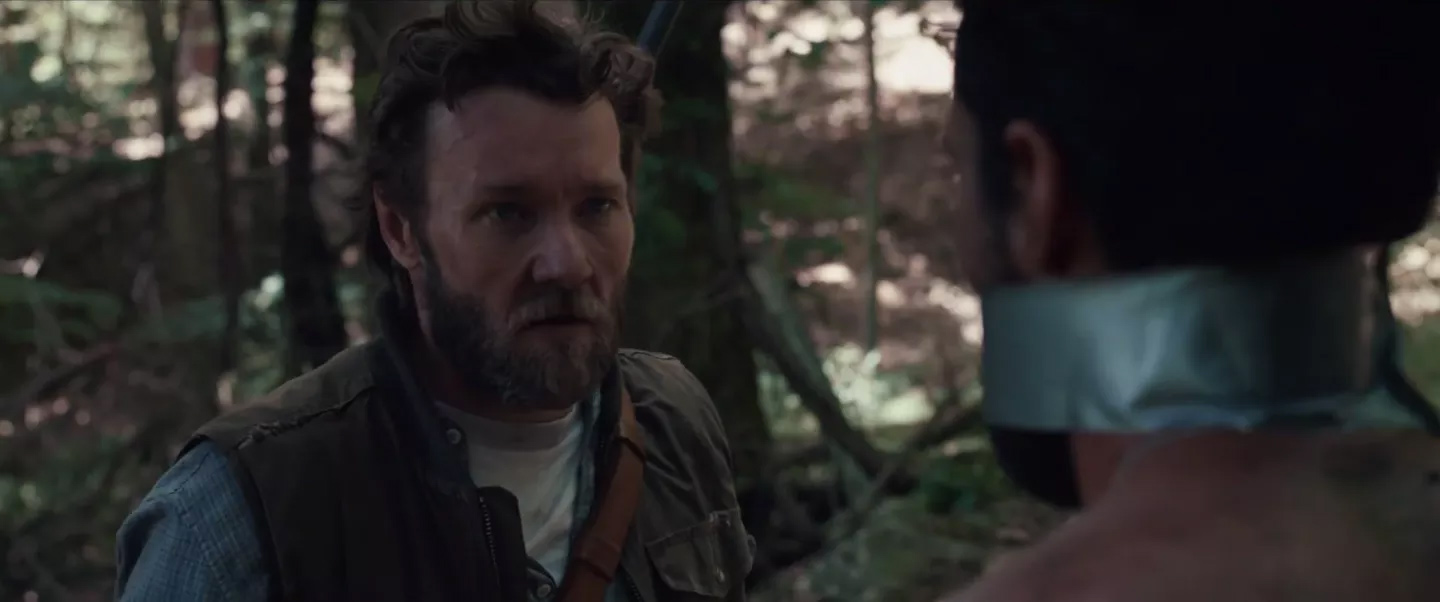Paranoia isn’t exactly a new theme in the horror genre. From Invasion of the Body Snatchers to Carpenter’s The Thing, horror characters have a long history of not trusting each other. Often this is for perfectly valid in-story reasons, even as the works reflect the less rational real world fears of their times. Trey Edward Shults’ psychological horror film It Comes at Night is a solid piece of filmmaking in this tradition and, even if paranoia is never quite out of style, it feels very specific to modern life.
I can’t help but compare this film to another very paranoid horror film, 2015’s The Witch. While it’s set during a different time period (modern day versus the seventeenth century), we yet again have a heavily regimented family living alone in the woods. Certain things are eternal, I guess. Whereas the isolation and devotion to law of The Witch’s Puritan family is due to their extreme religious beliefs, the survivalist family of It Comes at Night (we never get a last name) are holed up in the middle of nowhere for a rational reason: disease. As we put together during the early scenes, a highly virulent disease is spreading in the outside world. It comes on fast and seems to have a 100% mortality rate. Neither we nor the characters are sure just how bad it’s gotten back in civilization, but it was clearly bad enough to merit packing up and hiding out. Their nearly ritualistic lifestyle has its roots in simple self-preservation. No one goes out at night. No one goes into the woods alone. The only entrance into the house always stays closed and locked.
Also unlike The Witch, which makes clear very early on that there is in fact a witch at play in the woods, It Comes at Night holds its cards close to the vest. I won’t get into where, if anywhere, the film lands on the subject of the supernatural, but that ambiguity adds to the paranoia and unease of the film.
The family’s daily grind of survival, already disrupted by the loss of a loved one, is upended entirely when a man named Will (Christopher Abbott) attempts to break into their house. Will claims that he’s only searching for water for his family, sheltered some miles away, and that he thought the house was abandoned. After some deliberating, married couple Paul (Joel Edgerton) and Sarah (Carmen Ejogo) decide to invite Will’s family to stay with them, exchanging shelter and water for food. The inclusion of outsiders in their defensive lifestyle is a bit jarring at first, with Paul telling his teenage son Travis (Kelvin Harrison Jr.
) to trust no-one but family.
That said, the two families settle into something approaching a routine, and for a brief while the film feels like its settling into a pastoral post-apocalyptic narrative. For a brief while. This is a horror film, so I don’t think it’s a spoiler to say that doesn’t last.
Such a house-bound, character-centric film lives or dies on its performances, and this movie lives. Joel Edgerton is excellent as Paul. He’s a decent man who has been thrust into horrifying circumstances, which is a heck of a way to make a decent person do indecent things. He’s harsh and controlling and frighteningly comfortable with violence, but it’s all out of very human fears. Carmen Ejogo initially just seems to be taking her cues from her husband as Sarah, but as the film continues you see she’s just as pragmatic and ruthless as her husband.
Perhaps the most interesting and subtle performance is from New Orleanian1 Kelvin Harrison. His Travis might be the emotional core of the film: kind and welcoming but also sad and terrified beyond measure.
The filmmaking is effective without becoming needlessly flashy. There are the traditional jump scares and eerie, lantern-lit wanderings, but it’s never so stylized as to betray the small-scale, grounded nature of the story. The more sedate interpersonal scenes are shot with just as much of an eye for effect.
It is impressively crafted on every level.
It Comes at Night is a brief and narratively simple film that is emotionally and thematically weighty, and it carefully blurs the line between personal drama and overt horror. I think by making the central family multiracial, the movie circumvents more specific political interpretations, but it deals with the concept of xenophobia in its broader definition: fear of the unknown and the outsider. This is a tale of potentially rational concerns, whether they be disease or external forces intent on harm, warped into something irrationally brutal. It’s a story where a basic respect for humanity is sacrificed in the name of a potentially illusory sense of security. In that sense it couldn’t be more timely.








